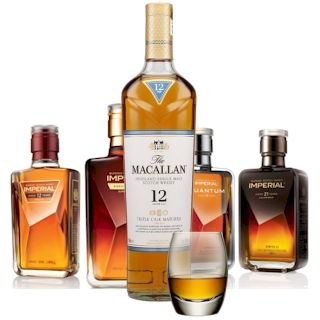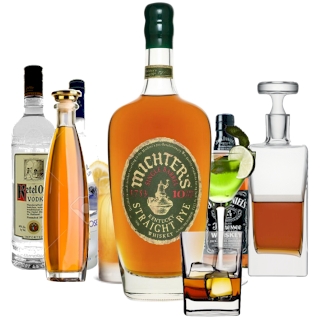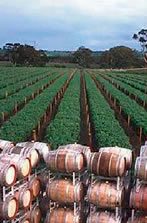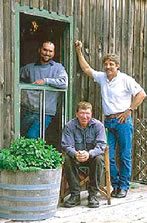


The wines move from a light red, The Rose of Virginia, described by Anthony Rose in London’s Observer newspaper as the best Rosé in Australia, through to Australia’s premier Rhone-style red, Nine Popes. Charlie Melton also makes small quantities of Shiraz, Cabernet Sauvignon and Sparkling Shiraz, and is the only Australian producer of a vin-santo styled dessert wine, Sotto di Ferro.

Charlie was one of the first to recognize the value and tradition of the Barossa’s old vineyard Grenache, Shiraz and Mourvedre. At a time when others were pulling out vineyards of Shiraz to plant more fashionable varieties, Charlie was convincing farmers to keep their historic vineyards. He was one of a small group of winemakers who helped retain the viticultural heritage of the Barossa.
It all began when a boy from Sydney named Graeme Melton, arrived in the Barossa Valley in 1973. Graeme and a mate needed jobs to fix their broken-down EH Holden ute to continue their road trip across Australia. There were two jobs going, one as a cellarhand at a local winery called Krondorf, and another pruning at a vineyard down the road. They flipped a coin – Graeme got the cellarhand job.
At Krondorf he met Barossa winemaking legend Peter Lehmann (chief winemaker for the Dalgety group, Stonyfeld and Saltram), and moved with Peter when he set up his new winery 6 years later. Lehmann refused to call his protégé Graeme, hence Charlie was born - and has stuck! During the next 10 years, Charlie honed his winemaking skills under Lehmann – and met his wife-to-be, Virginia. In that time, he also travelled to France, and developed the beginnings of what would become a life-long passion for the wines of the Rhone Valley, in particular the Southern Rhone where Grenache, Shiraz and Mourvedre are blended with up to 11 other varieties, as in the Chateauneuf du Pape appellation.

In 1984, Charlie purchased his first grapes to be made under the new Charles Melton label – and produced a Sparkling Red from old vines, dry-grown in the Barossa. He soon splashed out again – this time purchasing 13 acres of Grenache and Shiraz. At that time, he also built the cellar door and winery which still stands today in Krondorf Road, just outside Tanunda, in the valley of Barossa, in the state of South Australia. Around the time that Charlie was building his new winery and cellar door in Krondorf Road, the Australian Government was paying grape growers to pull out their old Barossa Shiraz and Grenache vines, known today as the great vine-pull scheme. The varieties had become unfashionable, Grenache being used mainly for cheap, high alcohol, fortified wines, Shiraz (in the darkest times) being made into Shiraz berry muffins. Charlie however, having seen the possibilities for Grenache and Shiraz in his travels throughout France, started experimenting in the vineyard. He began to prune the old vines harder so they would produce lower yields, and therefore concentrate more energy into fewer berries. All these vineyards are dry-grown, a strategy of not irrigating the vines, so they produce intense, concentrated flavours, undiluted by water. Because the Barossa has been spared the ravages of phylloxera, some of the Valley’s vines are aged in excess of 130 years old. This gives them decades of stored carbohydrates/energy, which enables them to survive without irrigation - and thus produce berries with intense, concentrated fruit flavours. These berries have a natural sweetness (even when fermented bone-dry) that is unrivalled in the world.
Charles Melton Wines owns approximately 50 acres of prime Barossa Vineyard, including Old bushvine Grenache, and younger Shiraz which surrounds the winery and cellar door in Krondorf Road in Tanunda. This site is slightly elevated, with gully breezes from the Barossa ranges only metres away providing a cooling effect. Further plantings of Grenache and Shiraz surrounds the Meltons home Woodlands. This is near Lyndoch (approximately 15 km south of Tanunda), and would be regarded as a milder site than those situated on the Barossa Valley Floor. This is due to a slightly higher level of humidity giving rise to fresher, more aromatic flavours.
Charlie and Virginia also source fruit from a select group of Barossa grape growers, many of whom have been growers for the Meltons since they started out 20 years ago. These growers include Val and Graeme Reeves who grow 3.5 acres of 60 year old Shiraz, some younger Shiraz, and less than an acre of Cabernet. They’re located at Williamstown, south of Tanunda. Brian and Barbara Storey grow a mere half an acre of 130 year-old Grenache and Shiraz vines (they’re crumbling they’re so old!), as well as three acres of younger Shiraz. They’re based in Greenock, over the road from the sought-after Greenock Creek Wines.
Foxy’s vineyard is literally over the fence from the Charles Melton winery. She grows 12 acres of Shiraz and two acres of Cabernet. Peter Boehm (who Charlie worked with in the early days at Saltram) has 2.5 acres of old Shiraz, some younger Shiraz and old Grenache – and a ‘splash’ of Pinot Noir for the Rose of Virginia. Andrew Harding provides the majority of the young Grenache and Cabernet material for the ever-increasingly popular Rose of Virginia. Yields from all the Charles Melton owned and contracted vineyards are extremely low – on average about 1.5 tonnes to the acre.
